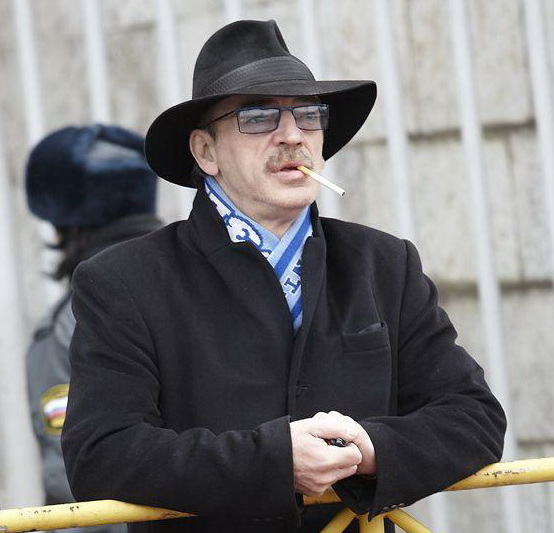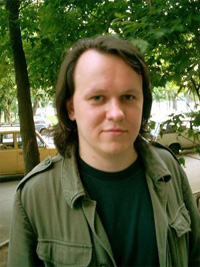Alexei Nikitin’s
Victory Park— yes, that is the
original title—is one of those books I think of as a lovely, fine mess. This is
the book I mentioned as having “too many backstories for its own good”: it’s a loose
and baggy novel, with a fairly large list of main and secondary characters. But
Victory Park is also the book I
described as “strangely endearing,” though I’m not sure what won me over most:
the setting in Kiev, Nikitin’s blend of tragedy and comedy, or any of about
five hundred details. Like a character mentioning Ardis’s 1981 edition of
Vasilii Aksenov’s Остров Крым, which became The Island of Crimea, in Michael Henry Heim’s
translation. I jotted a list of about twenty themes and motifs in the book without
cracking a sweat or even the book… sometimes a lovely, fine mess is just the right
thing.
In my reading, the most central character in the book is a
college student. His last name is Pelikan, like the bird, and he comes from a
family that does archaeological digs. Pelikan is infatuated with an unruly
schoolgirl named Irka—he wants to buy her some black market Pumas for her
birthday; this becomes a key plot element—but he’s also notable for receiving his
draft notice. Victory Park is,
appropriately enough, set in and around Victory Park during the perestroika
era, when the Afghan War is still going on and soldiers are coming home. Nikitin
adds historical and cultural depth to his setting by incorporating those digs, mentions
of Kievan Rus and World War 2, and a character known as Buben, a mysterious and
well-dressed man who’s come from Central Asia to Kiev for law enforcement but
is more interested in managing the narcotics trade in Victory Park. The park is
a quirky melting pot of nationalities and absurd ambitions.
 |
| Mikhail Boyarsky or Vilya? |
To expand on Pelikan’s story and offer more examples of the
breadth of Nikitin’s details, I’ll add this: Pelikan wants to buy the Pumas
from a black marketeer named Vilya who looks so much like actor Mikhail
Boyarsky, who played one of the Three Musketeers, that he can fool just about
anyone, including a married woman from Lithuania named Aphrodita whose husband,
conveniently traveling when Vilya and AphroditeAphrodita hook up, just
happens to be in law enforcement. Vilya comes to a bad end in Victory Park
because of territorial disputes (hint, hint to a plot theme!) rather than his resemblance
to Boyarsky (hint to wrinkles on identity). Pelikan and one of his
friends seem like convenient possibilities for Buben to pin the crime on…
though the reader witnesses the crime and knows neither is guilty.
Though I haven’t mentioned even a
quarter of the characters or (I suspect) even subplots, like a wild birthday for the wild Irka, this already covers lots
of the items on my jotted list, including some of the genres that Nikitin weaves
in: love story, since it’s Pelikan’s longing for Irka that drives him to want
those Pumas that result in Vilya’s downfall; crime novel, since we watch Buben
and his buddies do some awkward interrogating and investigating of various
wrongdoings; and social novel, since what we’re really watching is a Petri dish
of human behavior. Perhaps even more important, though, Victory Park is also a coming-of-age novel for the good-hearted Pelikan,
who begins as a guy who’s been called, late, for his military service and ends
up, of course, beginning that military service. On a larger scale, Victory Park is a coming-of-age novel
for the country that’s still the Soviet Union: Victory Park creates a thoroughly apt microcosm thanks to its (literal)
underground activists, Afghan vets, blend of cultures, people waiting at stores
for goods to arrive, sense of lawlessness and corruption, Georgian food, and whiff
of carnival. About the only item left on my penciled list is “motorcycles”; I’m
going to ignore my marginalia to keep things sane.
It’s Nikitin’s good-natured tone
and humor that keeps the book going, even when some of those backstories get a
little long: his humor and absurdity are gentle even when they’re sharp, and I
get the feeling he truly loves and knows his characters and their tender wishes.
That combines beautifully with his portrayal of human tragedy and hardships, economic
imbalances, and the era’s many geopolitical discomforts. I wish the geopolitical
discomforts and motifs of corruption and fighting for territory in Victory Park didn’t feel so relevant
these days.
I’ll end on the same note as
Tatyana Sokhareva did in her review of Victory Park for gazeta.ru: with a
quote from the book, one Sokhareva says is something Dovlatov would have been
proud of: “Я уж не говорю о свободе слова, о ней я предпочитаю свободно молчать,”
roughly “I’m not talking about freedom of speech here, I prefer to freely keep
quiet about that.” Fittingly, this comes from the book dealer who mentions
Ardis. The book’s full of lines like that, which is why it kept me such good
company—and kept me laughing—during a time with lots of work and distractions.
Up Next: Two more books that include Ukrainian settings—Evgeny
Vodolzakin’s Solovyov and Larionov
and Gleb Shulpyakov’s Museum Named After
Dante—and then Cartagena
by Lena Eltang, a complex murder mystery of sorts that I’m reading slowly to
appreciate all the details. There’s also been a nice crop of novellas lately…
Disclaimers: The
usual.



